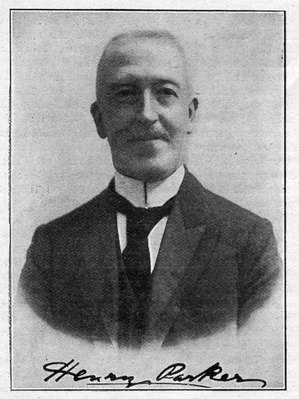 It is a notable fact in the history of English music that many of the most distinguished men in that line of work gained their first practical knowledge of music as choir boys.
It is a notable fact in the history of English music that many of the most distinguished men in that line of work gained their first practical knowledge of music as choir boys.The custom of using boy sopranos in the cathedrals and all important churches has resulted in the establishment of schools in connection with the work of the Church, in which boys are trained to assist in the musical service, receiving, at the same time, a very good general education. It is inevitable that out of so great a number of boys a fair proportion should later go into the musical profession.
This proved to be the case with the subject of the present sketch, Mr. Henry Parker, the composer, who is best known by his songs, although he has written successfully and very acceptably for the choir, the organ, the piano and the violin. Certain of his songs have been heard wherever the English tongue has been spoken and music practiced.
Mr. Parker was born in London, August 4, 1842. His first musical work was when, at the age of nine, he became a member of the choir of the Church of All Saints, Margaret Street, which had a daily service, and used a very complete musical service, being known as “very high church.” His activity was not confined to the church service, for he sang in all kinds of concerts, oratorios, etc., until his voice broke, a period that is usually a most distressing one to a boy singer.
During this time Mr. Parker turned his attention to instrumental music, first taking up the violin and then the organ. He made such good progress with the former instrument that he was able to obtain professional work as an orchestral player, and, from time to time, played in almost every orchestra in London, from those attached to small theatres up to the Covent Garden Opera Orchestra. His instructor in organ was the celebrated Dr. Hopkins, organist of the historic Temple Church, which owes its foundation to the great feudal order, the Knights Templar.
But this was not sufficient for the young musician. He now turned to Leipzig, and entered the Conservatory there, giving his attention specially to the piano and harmony, under Plaidy, Moscheles and Richter.
When he came back to London his first occupation was principally that of accompanist and also conductor with concert and opera companies. The great range of musical life in a great city like London fitted well with a man of such versatile training as Mr. Parker, and kept him busy. As he himself says: “It would be difficult to say what I have not done in connection with music, from arranging polkas to conducting Mozart’s ‘Requiem.’ “
Probably because he began his musical career as a singer Mr. Parker always preferred vocal music to any other form. After his voice settled he studied singing with such masters as Jules Lefort, Caravoglia and Wallworth, thus gaining a knowledge of the voice that has been of great advantage to him in his work as composer of vocal music, in making his melodies suit the average singer, and yet contain musical charm.
In 1879, after Mr. Parker had made a secure position in London musical life, he accepted a connection with the publishing house of J. B. Cramer & Co., which he held until 1888. During this period his pen was active, and a number of his pieces were extremely well received. In 1888 he gave up his work with Cramer & Co., as he “did not like to sit in judgment on works of others, perhaps friends, who were not so fortunate as to please the public.”
He holds but one official position now, that of Professor of Singing at the Guildhall School of Music, London. In addition to this he has a large number of private pupils. The rest of his time he devotes to composition.
In summing up Mr. Parker’s work we can do no better than to quote from a letter to the Editor, in which he says:
“Any success I have had as composer, I attribute to 1, Having been associated with the best singers; 2, Not writing too much; 3, Having a clever authoress (Nella) for my wife, who has assisted me with sensible words and valuable hints.”



